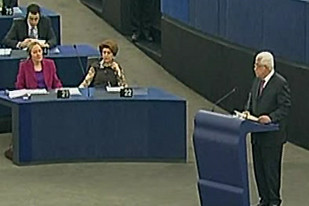
Palestinian Authority President Mahmoud Abbas addressing the European Parliament on the situation of people in Gaza. He said that Israel should be held responsible for the carnage., a photo by Pan-African News Wire File Photos on Flickr.
Palestinian president's op-ed highlights differences with Israel
by Adam Gonn
JERUSALEM, May 18 (Xinhua) -- An op-ed by Palestinian President Mahmoud Abbas in the New York Times on Monday has left Israeli Prime Minister Benjamin Netanyahu enraged.
Abbas begins the article by telling the story of how his own family was forced to leave their homeland and move to Syria.
What has infuriated Netanyahu and led him to claim that Abbas is "blatantly distorting known historical facts" is the following sentence.
"In November 1947, the General Assembly made its recommendation and answered in the affirmative. Shortly thereafter, Zionist forces expelled Palestinian Arabs to ensure a decisive Jewish majority in the future state of Israel, and Arab armies intervened. War and further expulsion ensured."
Netanyahu argues that Abbas failed to mention that when the UN in 1947 suggested a partition plan for one Jewish and one Arab part of what was then the British Mandate of Palestine, the Arab world rejected it and went to war with Israel the day after its independence was announced.
"The Palestinian refugees were an outcome of that war, not a cause," Netanyahu said, "Some Palestinian leaders themselves urged the Palestinians to vacate the land in order to make it easier for the Arab armies to fight for the destruction of Israel."
The op-ed was published days before Netanyahu is schedule to meet with U.S. President Barack Obama, who will give a speech to outline a new U.S. Middle East policy on Thursday.
Local analysts were divided on the op-ed's contents, stressing some differences that stand between Israel and the Palestinians. Israeli experts accused Abbas of trying to change history and giving a distorted picture of events. Palestinian analysts, on the other hand, backed their president and argued that the language used in his article was appropriate.
NO MIDDLE WAY
Samir Awwad of Birzeit University on the West Bank told Xinhua that the op-ed was a reflection of the current situation and that "Abbas is doing everything possible to reach an historic agreement with Israel."
Awwad said that a deal will not be made with the parties meeting in the middle of the road, as Israel is violating international law by maintaining the occupation of the West Bank. "So Israel has to come over to the Palestinian side of the road," he added.
"The thief and the house owner don't have equal rights to the house," Awwad said.
When the direct peace talk began almost 20 years ago, three issue were designated as final status questions: border of the future state, status of Jerusalem and return rights of the Palestinian refugees.
Settlement construction wasn't defined as a major issue then. However, with continued expansion of Israel's footprint on the West Bank, the question gained considerable attention in recent years.
"If Israel is going to give back the West Bank, what's point of building more settlements there now," Awwad questioned.
"No one was able to stop Israel, not the United States, not the International community. Israel keeps building, so that a withdrawal from the West Bank will be impossible," he said.
While the wording in the op-ed has been criticized by Israel, Awwad defended it, saying that "it's a language that is specific to the current situation."
No comments:
Post a Comment